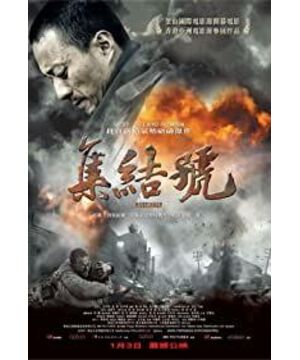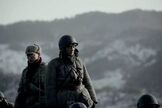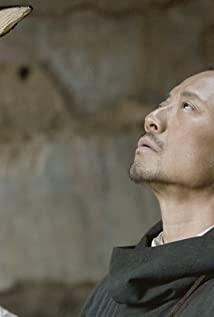According to Internet practice, Zhang Chenfeng, the three major directors in China, has to criticize the film as usual, especially for blockbuster films. Structurally speaking, it is possible to criticize the "Assembly No." for being out of proportion. The first part of the war is too long and shakes the camera too much. The second part is too brief, and the third part is too Zhu Jun. Technically speaking, the stunts are entirely Korean, and they are suspected of imitating Spielberg's "Saving Private Rain" and "Brother Company". From the propaganda point of view, it has been overblown and the big talk is too full, which reminds people of the traditional Chinese blockbuster's traditional use of propaganda to defraud money. In terms of details, military fans can also pick out a lot of bugs, tank models, gun classifications, etc. Finally, someone will give a general formula, similar to: "Flying Tai Chi Flag" + "Save the Soldier" + "Brothers" + "Passionate Years" + "Art Life".
But I gave this film 4 stars because it is really the best war film in China so far. Especially in the subject of civil war, it abandoned traditional heroism and romanticism, and restored the cruelty and absurdity of war. It did not praise or even criticize, but told a very cruel and confused story from a calm narrative perspective.
There was a battle that was unknown beforehand.
A group of soldiers who live and die together and are connected to each other.
A stubborn officer who lost his identity but never gave up.
A rallying call that never sounded, an unknown story of abandonment.
All of this, placed against the background of millions of people fighting, highlights the bizarre encounters of the company's long valley---like an ant fiddled with by the god of destiny, lost brothers, lost identity, lost The most precious trust in friends has also lost the trust that should belong to me. The film successfully shows how small an individual is in war, how the most precious life is sacrificed indifferently, how heroes and legends are overwhelmed and forgotten. Before the mighty power of destiny, how an ordinary person embodies the tenacity and responsibility of a man. And, because of this extremely meager persistence and hard work, he finally achieved his goal: to honor his dead brothers and seek justice for them. Although the final answer was unexpected, the two people who were forever separated by the Nether reached a reconciliation.
"Assembly Number" embodies the level of director and screenwriter, and is one of the domestic blockbusters that can tell the story well. If you want to know how awesome the screenwriter Liu Heng is, you can look at the movie's prototype novel, "The Lawsuit" by Yang Jinyuan. This 10,000-character short story is terrible. Even the basic short story narrative techniques are problematic. It can only barely be called a smooth narrative. And the story that Liu Heng extracted from this narrative, and the script adapted from it, are no better than the original. Attentive audiences can take a look at the dialogue and details in the movie, "You are not afraid of shouting loudly", "If you blow it up, you won't be able to pinch it up", and Gu Zidi's dull face and uniqueness when they got the martyrs' ratification documents. "Wait, I have to wash my face first." Something can be seen in it, something that is unusual in the domestic blockbuster.
Speaking of depth, "Assembly No." is not deep. There is no such piercing pain and grief in "Tai Chi Flag Flying", and even the anxiety about losing identity in "Bourne's Identity" And there is not much sense of oppression. Guzidi was portrayed as a body who had completely lost himself and only survived for his brothers, living in this world with extremely simple logic and persistence. At the same time, his emotions exploded too much in the second half, which weakened the strength of the film. However, this is forgivable, completely forgivable. Everyone can think that if the war is rendered more cruel; Guzidi’s identity should be transformed and strengthened, from a combat hero to a traitor and prisoner and even imprisoned; the ending is removed, and Guzidi burned in a pile of paper money and ratified it. The notice of the martyrs, finally committed suicide by the Wen River, may be even more shocking. However, it is not a blockbuster, but one of the most expensive domestic underground movies.
Although it is a commercial movie, Feng Xiaogang has made at least half of a very manly movie. At least the Chinese soldiers in the war scene acted like wind and fired their guns swiftly, which can be said to be very "sassy." To say that there is really any flaw, it is too damn like the US army, too much like the Battle of Bastogne in "Brothers", the soldiers are too modern, and they do not have the simplicity of the rural children during the war of liberation. But they are very lively people, fearful, sad, and greedy for survival. The image of a soldier is no longer the traditional method of fearlessness and minor problems: the hero died in glory, and he had stolen sugar cane before his death. Gu Zidi shooting prisoners of war, this plot alone is better than a dozen domestic war films.
Among the three major directors, I still admire Feng Xiaogang the most. Zhang Yimou is playing a star and Chen Kaige is playing an artist. Only Feng Xiaogang is a filmmaker. At least he is very smart. He knows where to poke the people to laugh and where to poke the people to cry. "The Banquet" was the beginning of his attempt at a blockbuster film. Although it was very unsuccessful, he quickly found the right feeling on "Assembly Number". He knows how to tell a story well, can find a big money-saving head, can integrate the resources in his hand, and make a movie with more than 80 points. Feng Xiaogang rarely makes movies with a score of 90 or more, but almost every film of his has scores of 80 or more, so he can't accept it. Earlier, I was worried that his movie would be defeated by "Voting the Name". But looking at it now, Chen Kexin is afraid that he will wipe a cold sweat.
Perhaps, all the points worthy of criticism in "Assembly No." contain a possibility --- Feng Xiaogang knows what it should be, but he also knows what it can do. A martyr is equal to 700 kilograms of millet, and only Xiaogang dares to shoot like that in the Lunar New Year blockbuster. In this sense, director Zhang and Director Chen have already learned about making blockbuster films in China, and only Xiao Gang is really worth looking forward to.
View more about Ji jie hao reviews











